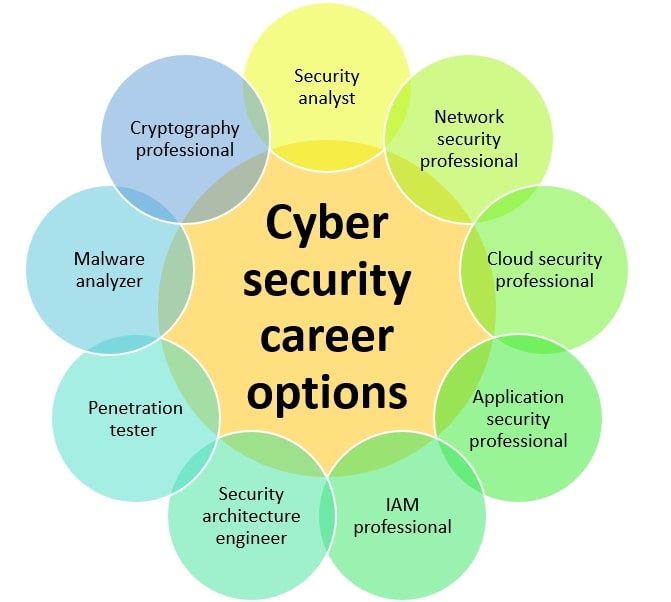Cybersecurity Careers: Exploring Roles, Responsibilities, and Pathways to Success
Cybersecurity Careers: Exploring Roles, Responsibilities, and Pathways to Success
Navigating the Diverse Landscape of Cybersecurity Careers: Roles and Responsibilities
In today's digitally driven world, cybersecurity has emerged as a critical field dedicated to protecting information systems from threats and vulnerabilities. As cyber threats become more sophisticated, the demand for skilled cybersecurity professionals continues to rise. This article explores various cybersecurity roles, detailing their responsibilities and the skills required to excel in each position.
1. Security Analyst
Role Overview: Security analysts are responsible for monitoring and protecting an organization's networks and systems.
Key Responsibilities:
- Monitor security alerts and investigate potential threats.
- Conduct vulnerability assessments and risk analyses.
- Implement and manage security measures to protect information systems.
Required Skills:
- Proficiency with security information and event management (SIEM) tools.
- Strong analytical and problem-solving abilities.
- Knowledge of network protocols and intrusion detection systems.
Certifications:
- CompTIA Security+
- Certified Information Systems Security Professional (CISSP)
2. Incident Responder
Role Overview: Incident responders, also known as intrusion analysts, are the frontline defense against cyber threats, responding to security breaches and mitigating potential damages.
Key Responsibilities:
- Investigate security incidents to determine their scope and impact.
- Develop and implement incident response strategies.
- Collaborate with other teams to prevent future incidents.
Required Skills:
- Expertise in digital forensics and malware analysis.
- Ability to work under pressure during security emergencies.
- Strong communication skills for coordinating with different departments.
Certifications:
- GIAC Certified Incident Handler (GCIH)
- Certified Information Systems Security Professional (CISSP)
3. Penetration Tester (Ethical Hacker)
Role Overview: Penetration testers simulate cyberattacks to identify and address security vulnerabilities within an organization's systems.
Key Responsibilities:
- Perform controlled attacks on networks, applications, and systems.
- Document findings and provide recommendations for security improvements.
- Stay updated on the latest hacking techniques and security trends.
Required Skills:
- Proficiency in programming and scripting languages.
- Deep understanding of network and application security.
- Analytical thinking and problem-solving capabilities.
Certifications:
- Certified Ethical Hacker (CEH)
- Offensive Security Certified Professional (OSCP)
4. Security Engineer
Role Overview: Security engineers design and implement robust security systems to protect an organization's IT infrastructure.
Key Responsibilities:
- Develop and maintain security tools and technologies.
- Conduct security assessments and architecture reviews.
- Collaborate with IT teams to integrate security measures into system designs.
Required Skills:
- Knowledge of security protocols and encryption techniques.
- Experience with firewall management and intrusion detection systems.
- Strong troubleshooting and analytical skills.
Certifications:
- Certified Information Systems Security Professional (CISSP)
- Certified Information Security Manager (CISM)
5. Security Consultant
Role Overview: Security consultants provide expert advice to organizations on how to protect their information systems and data.
Key Responsibilities:
- Assess current security measures and identify vulnerabilities.
- Recommend and implement security solutions tailored to the organization's needs.
- Conduct security training and awareness programs for staff.
Required Skills:
- Broad knowledge of security standards and regulations.
- Ability to assess risks and develop mitigation strategies.
- Excellent communication and presentation skills.
Certifications:
- Certified Information Systems Security Professional (CISSP)
- Certified Information Security Manager (CISM)
6. Security Architect
Role Overview: Security architects design and oversee the implementation of network and computer security for an organization.
Key Responsibilities:
- Develop security architectures that align with business objectives.
- Evaluate and select security products and technologies.
- Establish security policies and procedures.
Required Skills:
- Deep understanding of IT infrastructure and security frameworks.
- Experience in designing secure networks and systems.
- Strategic thinking and project management skills.
Certifications:
- Certified Information Systems Security Professional (CISSP)
- Certified Information Security Manager (CISM)
7. Chief Information Security Officer (CISO)
Role Overview: A CISO is a senior executive responsible for an organization's information and data security.
Key Responsibilities:
- Develop and implement information security strategies.
- Oversee the organization's security operations and teams.
- Ensure compliance with regulatory requirements and industry standards.
Required Skills:
-
Leadership and strategic planning abilities.
-
Comprehensive understanding of risk management and compliance.
-
Excellent communication skills to interact with stakeholders and board members.
#Cybersecurity #InfoSec #EthicalHacking #PenetrationTesting #SecurityAnalyst #CyberThreats #DataProtection #CareerGuide #CyberJobs #CISO #NetworkSecurity #IncidentResponse

Comments
Post a Comment